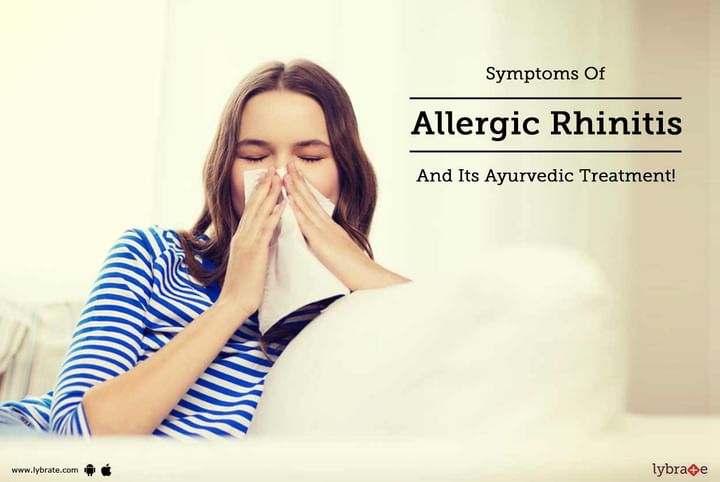Symptoms Of Allergic Rhinitis And Its Ayurvedic Treatment!
Allergic rhinitis is defined as allergic symptoms in the nasal passage. Allergic rhinitis can be seasonal (occurring during specific seasons) or perennial (occurring year round). The allergens that most commonly cause seasonal allergic rhinitis include pollens from trees, grasses and weeds, as well as spores from fungi and moulds. The allergens that most commonly cause perennial allergic rhinitis are house dust mites, cockroaches, animal dander and fungi or moulds. Perennial allergic rhinitis tends to be more difficult to treat.
How does allergic rhinitis occur ?
This condition occurs when allergens (allergy- causing substances) come into contact with the nose, and usually also the ears, sinuses, and the throat. When allergens come in contact with the lining of the nose and sinuses, they trigger the cells to release the chemical histamine, which causes the allergy symptoms described below.
What are the symptoms ?
- Nasal congestion
- Sneezing
- Watery " runny nose"
- Itchy eyes,nose,or throat
- Puffy eyes or 'allergic shiners'
- Post nasal drip
- Tears
These symptoms may occur during a certain season or year long. They can occur at any age.
Risk factors for allergic rhinitis
Allergies can affect anyone, but you’re more likely to develop allergic rhinitis if your family has a history of allergies. Some external factors can trigger or worsen this condition, including:
- Cigarette smoke
- Chemicals
- Cold temperatures
- Humidity
- Wind
- Air pollution
- Hairspray
- Perfumes
- Colognes
- Wood smoke
- Fumes
Ayurvedic concept of rhinitis:
As per Ayurveda, Allergic rhinitis is compared with Vata- Kaphaja pratishaya. The concept of Ama, Asatmya and virudh aahara also predict the allergic conditions.
Ama is the product of impaired digestion and metabolism. It affects Rasa and Rakta Dhatu leading to manifestation of Pratishyaya. Wrong food combinations (Virudh aahar) having antagonist properties like fish with milk, fruit juice with milk, clarified butter with honey, ice cream after night meals, etc. leads to allergy.
Ayurveda believes in balancing the three doshas present in the human body, thus treating the disease on the whole. Treatment involves clearing the sinuses and expelling phlegm, alleviating the relevant dosha and detoxification. To permanently resolve this disorder, dietary and lifestyle adjustments may be necessary in addition to the strengthening of the immune system. Panchakarma is an effective means of treating Allergic Rhinitis.
Ayurvedic treatment for allergic rhinitis:
- If the symptoms are severe and in chronic conditions, Vamana Panchakarma treatment, followed by Virechana is administered. This helps to relieve Ama and balance Tridosha.
- In some cases, where the patient has normal digestion strength, Nasya treatment (nasal drops therapy) is administered with herbal oils such as Anu taila or Shadbindu Taila.
- After the above Panchakarma treatments, Ayurvedic medicines are administered to improve respiratory immunity and strength of upper respiratory tract.
Useful Ayurvedic medicines in treating allergic rhinitis:
- Nimbarajanyadi tablet – Contains neem and turmeric as main ingredients.
- Chavikasavam – Fermented Ayurvedic liquid, also used in urinary tract disorders.
- Mahalaxmi Vilas Ras – Also useful in the treatment of skin diseases, diabetes, Sinus, non healing wounds, etc.
Other medicines: Narada lakshmi vilas rasa, Anand bhairava rasa, tribhuvan kirti rasa, shringarabharaka rasa, Mayur shringa bhasma, Abhraka bhasma, Lavangadi pills, Sitopaladi choorna, Marichayadi yoga, vyoshadi pills, Khadiradi pills are suggested.
Diet management:
- Take – Light food, lukewarm water, Kapha nashaka foods like little spicy food, saindhav salt, legumes, soups etc.
- Avoid – heavy food, fermented food, congestive food, too hot or too cold food, soar food, non vegetarian food, sweets, banana, curd, yogurt, ice creams, deserts, cakes, yellow grams, etc.
- Avoid Alcohol and cold beverages.
If you wish to discuss about any specific problem, you can consult an ayurveda.
- Avoid Alcohol and cold beverages.



+1.svg)
